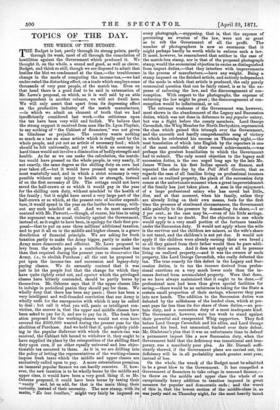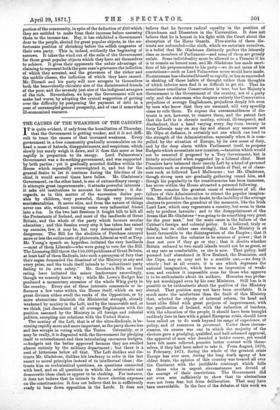TOPICS OF THE DAY.
THE WRECK OF THE BUDGET.
THE Budget is lost, partly through its strong points, partly through its weak, most of all through the cumulation of hostilities against the Government which produced it. We thought it, on the whole, a sound and good, as well as clever, Budget, and think so still, though we are disposed to admit that besides the blot we condemned at the time,—the troublesome change in the mode of computing the income-tax,—we had under-rated the disturbing effect, on a trade which employs some thousands of very poor people, of the match tax. Even on that head there is a good deal to be said in extenuation of Mr. Lowe's proposal, on which, as it is well said by an able correspondent in another column, we will not dwell here. We will only assert that apart from its depressing effect on the productive industry of the match manufacture, —in which we admit an element of truth that we had insufficiently considered last week,—the criticisms upon the tax have been very wild and foolish. We believe that the strong support it received from men like Dr. Lyon Playfair, to say nothing of "the Cabinet of financiers," was not given in blindness or prejudice. The country wants nothing so much as a tax on some article which is really used by the whole people, and yet not an article of necessary food ; which should be felt universally, and yet in which an economy in hard times would not involve a diminution of bodily strength and health. As far as we can make the calculation, the match- tax would have pressed on the whole people, in very nearly, if not exactly, the same degree as the shilling duty on corn last year taken off,—but it would have pressed upon an article most wastefully used, and in which a strict economy is very possible without any injury to health or strength, instead of on the first necessary of life. The cottage could not have saved the half-crown or so which it would pay in the year for the shilling corn duty, without mischief to the health of the family ; but it might have saved a very large part of the half-crown or so which, at the present rate of lucifer expendi- ture, it would spend in the year on the lucifer-box stamp, with- out any such mischief at all. And we do most earnestly contend with Mr. Fawcett,—though, of course, his bias in using the argument was, as usual, violently against the Government, instead of, as it ought to have been, in apology for their first pro- posal—that to put on near three millions' additional taxation, and to put it all on to the middle and higher classes, is a grave dereliction of financial principle. We are asking for fresh taxation partly to make the Army bigger, partly to make the Army more democratic and efficient. Mr. Lowe proposed to levy from the whole people a contribution somewhat less than that required during the present year to democratize the Army, i.e., to abolish Purchase ; all the rest he proposed to put upon the income-tax and succession and legacy-duty paying classes. We do earnestly contend that it was just to let the people feel that the change for which they have quite rightly cried out, and against which the privileged classes have bitterly contended, should be partly borne by themselves. Mr. Osborne says that if the upper classes like to indulge in periodical panics they should pay for them. We wholly deny that there has been any panic ; there has been a very intelligent and well-founded conviction that our Army is wholly unfit for the emergencies with which it may be called to deal ; but call it what you will, panic or intelligent con- viction, the answer is, that the upper and middle classes have been asked to pay for it, and are to pay for it. The fresh tax- ation proposed for the working-classes would not even have covered the £600,000 wanted during the present year for the abolition of Purchase. And we hold that if, quite rightly yield- ing to the popular disfavour with which the match-tax was received, the Cabinet felt bound to withdraw it, they ought to have supplied its place by the reimposition of the shilling fixed duty upon corn, if no other equally universal and less objec- tionable tax occurred to them. As it is, we are drifting into the policy of letting the representatives of the working-classes impose fresh taxes which the middle and upper classes are exclusively called upon to pay. A more ostentatious premium on immoral popular finance we can hardly conceive. If, how- ever, the new taxation is to be wholly borne by the middle and upper class, it would have been a very good. thing if. as Mr. Osborne proposed, it could have been borne by taxing their " vanity " and, let us add, for that is the main thing, their curiosity, instead of their necessity. The new stamp, with its motto, "Ex /lice tuce/ium," might very fairly be imposed on
every photograph,—supposing, that is, that the expense of' preventing an evasion of the law, were not so great
as to rob the Government of all the profit. The- number of photographers is now so enormous that it might perhaps hardly be worth while to enforce such a law. It must, however, be remembered that neither in the case of the match-box stamp, nor in that of the proposed photograph stamp, would the economical objection to excise as distinguished from import duties,—that they interfere with improvements. in the process of manufacture,—have any weight. Being a stamp imposed on the finished article, and entirely independent of the mode in which that article is produced, the only purely economical question that can be fairly raised, is as to the ex- pense of enforcing the law, and the discouragement of con- sumption. With respect to the photographs, the expense oE enforcing the law might be great ; the discouragement of con- sumption would be infinitesiMal, or nil.
The extreme weakness of the Government was, however,. most shown in the abandonment of the Legacy and Succession duties, which was not done in deference to any popular outcry, but was a flight before the county members. Lord George Cavendish, the Whig Member for North Derbyshire, represented the class which gained this triumph over the Government,. and the uncouth and hardly comprehensible song of victory' in which he celebrated his success on Thursday night,—the neat translation of which into English by the reporters is one of the most creditable of their recent achievements,—was perhaps the greatest humiliation to which the Government had to submit. The only sound objection to the legacy and succession duties, is the one urged long ago by the late Mr.. James Wilson in his first Indian speech on finance, and repeated the other day by the Pall Mall Gazette, that as. regards the case of all families living on professional incomes.. and not on realized property, the pinch of the succession duty comes at the unfortunate moment when a great impoverishment. of the family has just taken place. A man in the enjoyment. of a large professional salary who has saved but little,.. dies, and at that moment, when his family, unless they are already living on their own means, feels for the first. time the pressure of straitened circumstances, the Government adds painfully to the pressure by demanding its share,-1 or 2 per cent., as the case may be,—even of his little savings.. That is very hard no doubt. But the objection is one whiclie would apply to a very small portion of the fortunes taxable under the Succession duty. It would not apply where the wife- is the survivor and the children are minors, as the wife's share is not taxed, and the children's is not yet due. It would not apply if the children were already earning their own bread ; as all they gained from their father would then be pure addi- tion to their means. And it does not apply at all to persons.' living on realized property,—and it was the owners of such property, like Lord George Cavendish, who really defeated the- tax. The true remedy for this defect in the Legacy and Suc- cession duties, is to tax the incomes derived from profes- sional exertions on a very much lower scale than the in-. comes derived from accumulated property. Were that done,. as we have always maintained that it ought to be done,—if professional men had been thus given special facilities for saving,—there would be no unfairness in taking for the State a certain small proportion of their savings, whenever they pass.- into new hands. The addition to the Succession duties was defeated by the selfishness of the landed class, which at pre- sent pays far less than its due share of these duties,—no pro-- bate duty, and a succession duty of a most inadequate kind'. The Government, however, were too weak to stand against their powerful and exasperated Whig supporters. They fled■ before Lord George Cavendish and his allies, and Lord George sounded his loud, but unmusical, timbrel over their defeat. Mr. Gladstone's plea that it was an unfortunate time to defend? a permanent impost like a new Succession duty, when the- Government held that the deficiency was transitional and tem- porary, was a manifestly poor plea. As Mr. Disraeli suffi- ciently showed, if the Government plans are carried out, the deficiency will be in all probability much greater next year,. instead of less.
On the whole, the wreck of the Budget must be admitted to be a great blow to the Government. It has compelled a Government of financiers to take refuge in unsound finance,— to throw on the middle and upper class the whole of an exceptionally heavy addition to taxation imposed in great measure for popular and democratic ends ; and the worst of this is, that the lowest section of the middle-class is, as was justly said on Thursday night, far the most heavily taxed portion of the community, in spite of the deduction of £60 which they are entitled to make from their incomes before assessing them to the income-tax. Nay, it has exhibited a Government dear to the people, elected for great popular objects, in the un- fortunate position of shrinking before the selfish magnates of their own party. This is, indeed, evidently the beginning of sorrows. It takes the wind out of the sails of the Government for those great popular objects which they have set themselves to achieve. It gives their opponents the unfair advantage of claiming to represent both the poor man's grievance the infliction of which they arrested, and the grievance of the richer and the middle classes, the infliction of which they have caused. Mr. Disraeli and his party will now arrogate to themselves both the benevolently chivalric airs of the disinterested friends of the poor, and the severely just airs of the indignant avengers of the rich. Nevertheless, we hope the Government will not make bad worse, by adopting the cynical suggestion of getting over the difficulty by postponing the payment of debt in a year of unexampled general prosperity, and of vast if somewhat ill-economized resource.



































 Previous page
Previous page